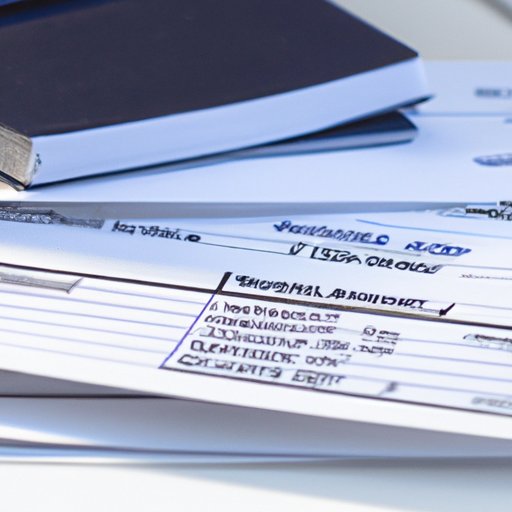Introduction
Financial records are important for tracking your financial activity and staying organized. It is crucial to understand how long you have to keep financial records in order to ensure that they are properly maintained and stored. This article will provide a guide to how long you should keep financial records, as well as tips on managing and storing your financial records.
A Guide to How Long You Should Keep Financial Records
What are the Recommended Timeframes for Keeping Financial Records?
The exact length of time for which you should keep financial records depends on the type of record, but generally speaking, it is recommended that you keep most financial records for at least seven years. According to the U.S. Small Business Administration, “Financial records should be kept as long as they may be needed for the administration of your business and tax purposes. Generally, this means keeping records that support an item of income, deduction or credit shown on your tax return until the period of limitations for that tax return runs out.”
The Statute of Limitations on Financial Records
The statute of limitations is the amount of time the IRS has to audit your taxes and assess any additional taxes due. In most cases, the statute of limitations is three years from the date you file your tax return. However, there are exceptions to this rule. For example, if you fail to report more than 25% of your total income, the statute of limitations is extended to six years. Therefore, it is important to keep your financial records for at least six years to be sure that you are in compliance with the statute of limitations.

Retention Periods for Tax and Financial Records
When it comes to determining how long you should keep financial records, it is important to consider the specific types of records you have. Here is a brief overview of the recommended retention periods for some of the most common types of tax and financial records:
Tax Returns
You should keep your tax returns and all supporting documents (such as W-2s and 1099s) for at least seven years, as the IRS can audit your taxes up to three years after the filing deadline. If you file an amended return, you should keep the original return and the amended return for at least three years.
Bank Statements
You should keep bank statements for at least one year, as banks are only required to keep records for that amount of time. However, it is recommended that you keep them for at least seven years, as they can be used to verify income, deductions, and other information on your tax return.
Credit Card Statements
Credit card statements should be kept for at least one year, as this is the amount of time that credit card companies are required to keep records. However, it is recommended that you keep them for at least seven years, as they can be used to verify deductions and other information on your tax return.
Investment Records
Investment records, such as stock and mutual fund statements, should be kept for at least three years, as they are often used to verify capital gains and losses. If you sell investments, you should keep records of the sale for at least seven years.
Loan Documents
You should keep loan documents, such as mortgage documents, for at least seven years, as they are often used to verify deductions and other information on your tax return. Additionally, if you refinance your home, you should keep documents related to the refinancing for at least seven years.
Managing Your Financial Records: How Long Is Too Long?
Reviewing Your Financial Records
It is important to periodically review your financial records to ensure that you are not keeping records for longer than necessary. This is especially important if you have moved, changed jobs, or experienced any other major life changes in the past few years.
Determining When to Purge Records
Once you have reviewed your financial records, you should determine when to purge records that are no longer necessary. The best way to do this is to create a system for organizing and labeling your records so that you know what needs to be kept and what can be discarded. For example, you might create labeled folders for each year and store all of the relevant documents in the appropriate folder.
Storing and Protecting Your Financial Records
Once you have determined which records need to be kept, it is important to store them in a safe and secure location. Paper records should be stored in a fireproof safe or locked cabinet, while digital records should be backed up regularly and stored in a secure cloud storage service. Additionally, it is important to shred any documents that contain sensitive information before discarding them.
Conclusion
Financial records are important for tracking your financial activity and staying organized. It is important to understand how long you have to keep financial records in order to ensure that they are properly maintained and stored. This article provided a guide to how long you should keep financial records, as well as tips on managing and storing your financial records. By understanding the recommended timeframes for keeping financial records and implementing a system for organizing and protecting them, you can ensure that your financial records are accurate and up to date.
(Note: Is this article not meeting your expectations? Do you have knowledge or insights to share? Unlock new opportunities and expand your reach by joining our authors team. Click Registration to join us and share your expertise with our readers.)
